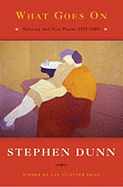in more than one translation, that keep Fernando Passoa, at least in English, often unsold for years, such bookstores become less likely every day. The sales of poetry in such places seldom justify the selection. The section is maintained as a matter of duty, which, you will agree, is a rather quaint word when applied to contemporary retail, even in bookselling. There is, right here in Seattle, a marvelous store, specializing just in poetry, Open Books: A Poem Emporium. The owner's a poet, so he may be a little mad (they often are you know, historically.) He and his fellows must at least be used to doing without. Bless 'em. How else to explain so glorious an institution as a poetry bookstore?! Anyone who hasn't been should go. It's a wonderful place. When I go, I feel I should bring a covered dish. Instead I buy books for friends I can't usually quite afford, though the prices are quite good. Go and do likewise.
Even working in a very good, old fashioned -- dare I say dutiful? -- bookstore, so much of the poetry that comes in new seems to pass directly to the shelves unnoticed even by me. New poetry tends to be reviewed, if reviewed at all, in rather specialized publications, periodicals written by and for, as it were, and as I am no poet, I tend to find new poets by way of The New Yorker Magazine, or by quoted recommendations from poets I do know on the back jackets of new books with arresting covers, or because of the personal recommendations of poet/friends, like my friend R. I am lucky also to have friends among my regular customers, sophisticated, better-educated, folk, who read poetry regularly and seriously, but who do not write it themselves. Finding such a friend, by the way, is not as difficult as it sounds. I wouldn't necessarily look to find them at poetry readings. I enjoy such occasions myself, but I've learned to slip out before the general post-reading-chat, or at least without mentioning where I work, for fear of being button-holed about getting someone's chapbook stocked. I've found over the years in bookstores, the best way to meet people who will make good recommendations, is to note customers with poetry being purchased or read in the store, and if the poet or the book is unknown to me, I ask about it. One has to be patient though, and willing to accept quite a few mumbled rebuffs. Poetry readers tend to be solitary souls in my experience, shy if not suspicious of uninvited interest in their purchases, at least when my hairy self suddenly looms up before them, soliciting opinions. I've learned to be gentler with them than is my normal presentation. But if one is lucky, the poetry reader will be neither an unpublished poet, nor unsociable, nor Heaven forbid, looking for recommendations from so sorry a source as me, and may even be only too eager to be chatted up about David Wagoner, as was, for example my regular customer and now my friend, J., who has introduced me now to many Northwest poets I, an outlander, might never have known otherwise.
Meanwhile though, I cruise through the poetry shelves on my own, now and again, as I did just today, and find books that may or may not be all that new, but that are absolutely new to me.

What Goes On: New and Selected Poems 1995 - 2009, by Stephen Dunn, published by W. W. Norton, for example, is the latest collection by a poet I first encountered reading, I should think, The New Yorker. I'm terribly excited to have his new book with me now. Now the man won the Pulitzer Prize before I'd ever read him, which should give you some idea of my credentials for endorsing him here. Having found him though, by whatever means, I am now a regular reader and an enthusiast.
Verses and Versions: Three Centuries of Russian Poetry, selected and translated by Vladimir Nabokov, edited by Brian Boyd and Stanislav Shvabrin, published by Harcourt Brace, seems to have been on our shelves since at least October last, but I never saw it until today. The text is dual language, the original, beautiful Russian on the left, Nabokov's translation facing. The Russian does me no good as a sadly monolingual reader, but it looks fine, and this
collection would seem to be, from the introduction, unbelievably, the first truly comprehensive collection of the great novelist's translations of poetry. I can't imagine. Obviously, after reading no further than the introduction and a few poems, this is a book I may have to own. How wonderful to see it there on the shelf, finally, after so many months. (I do wonder though, this book must surely have been reviewed even in such common book reviews as I read? How did I miss it?)
All of It Singing: New and Selected Poems, by Linda Gregg, published by Graywolf Press, would be the most recent example of a new book by an author I came to know only because a friend put an earlier book into my hands, turned to a poem he knew I would like, and bid me, "read." Gregg is quite wonderful. "New and Selected" is a phrase I particularly like, as it suggests a friendly nod to my usual, woeful neglect of even poets I like, without any hint that I've been entirely remiss -- "Complete and Collected" tells me I sadly have not been paying attention even to The New York Times obituaries. Fortunately, Ms. Gregg is obviously, quite robustly alive and productive.

No comments:
Post a Comment